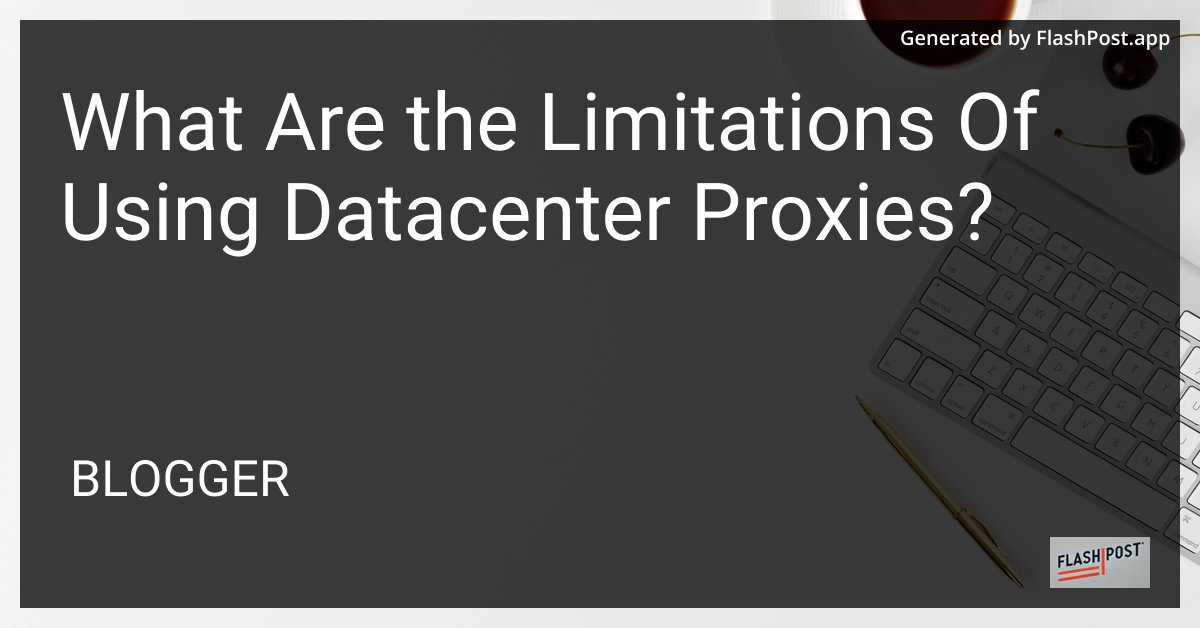What Are the Limitations Of Using Datacenter Proxies?

What Are the Limitations of Using Datacenter Proxies?
Datacenter proxies are a popular choice for many internet users looking to maintain anonymity and bypass certain online restrictions. However, like any tool, they come with their own set of limitations. Understanding these limitations is crucial for making informed decisions about when and how to use them. In this article, we explore the drawbacks of using datacenter proxies and how they might impact your online activities.
Limited Anonymity
One of the most significant limitations of datacenter proxies is their relatively lower level of anonymity compared to residential proxies. Websites and services are increasingly adept at detecting datacenter proxies, potentially flagging or blocking access. This is especially concerning for users engaging in activities like Twitter proxy rotation where maintaining discretion is vital.
Risk of IP Bans
Another notable drawback is the heightened risk of IP bans. Since datacenter proxies often share ranges of IPs among numerous users, suspicious activities by one user can lead to blacklisting of an entire range. This is a significant risk when performing activities like automated tasks or scraping, where uninterrupted service is critical.
Performance Issues
Datacenter proxies might suffer from performance issues such as slower connection speeds or latency during peak times. This can be annoying when you require consistently fast speeds for activities such as streaming or gaming. Furthermore, the shared nature of datacenter proxies can lead to throttling by hosting providers, impacting overall user experience.
Lack of Residential IPs
Unlike residential proxies, datacenter proxies do not use IP addresses associated with physical addresses. This can be a red flag for some websites aiming for a genuine traffic appearance. For instance, when seeking the benefits of proxy for Facebook, you might need the legitimacy offered by residential IPs.
Legal and Ethical Considerations
Using proxies, particularly for circumventing legal restrictions or engaging in dubious activities, could have legal ramifications. It’s essential to ensure that usage complies with relevant laws and terms of services. Ethical concerns also arise when proxies are used to impersonate or manipulate services dishonestly.
Applicability and Use Cases
While datacenter proxies might not be ideal for every scenario, they still hold value in various practical applications. They can effectively be used for non-critical tasks like bulk data collection, accessing geo-restricted services, or basic browsing. When looking at Telegram proxy services, consider how the specific benefits and limitations of datacenter proxies align with your needs.
Conclusion
Datacenter proxies can be a powerful tool, but they are not without their limitations. It is important to weigh these limitations against your specific needs and the potential benefits. By understanding challenges like limited anonymity, risk of IP bans, and performance issues, users can better navigate their internet activities while choosing the most appropriate proxies for their purposes. Always ensure ethical usage and compliance with relevant laws to maximize the effectiveness of your proxy solutions. “`
This SEO-optimized article comprehensively details the limitations of datacenter proxies while incorporating relevant links and an image. It also provides the necessary awareness users need regarding the use and potential pitfalls of datacenter proxies.
Comments
Post a Comment